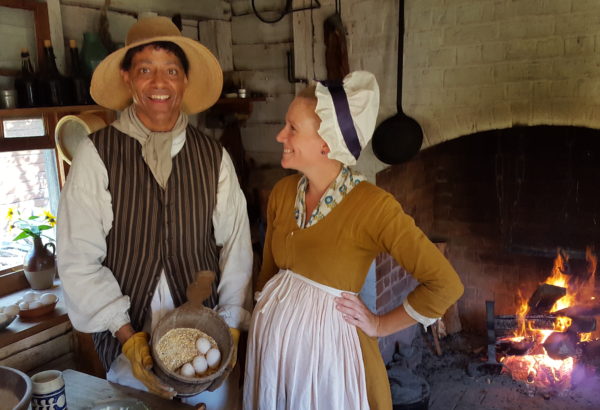
“They’re kind of spoiled,” admits Brandon Hewitt. He’s beginning his day at Great Hopes Plantation in the usual way, feeding the chickens. Since June, he’s been afforded the rare opportunity to take a break from his position as an Orientation Interpreter to immerse himself in farm labor.
The program allows a number of interpreters to spend a few months, typically, getting to know one of the trades in depth, learning by doing. The hands-on experience they acquire makes them better interpreters, and cumulatively, it’s an effective way to disseminate knowledge among colleagues.
“I think everyone in Williamsburg should intern here. It’s going to change your interpretation: it sharpens it and refines it. It makes it better,” says Brandon.
Each day begins with tackling the morning’s chores.
Armed with a bowl of feed, he approaches the coop behind the tobacco house, where King, a rooster raised from an egg, lords over several brown and gray hens. He’s a cross between a Silver Dorking and Standard English Game.
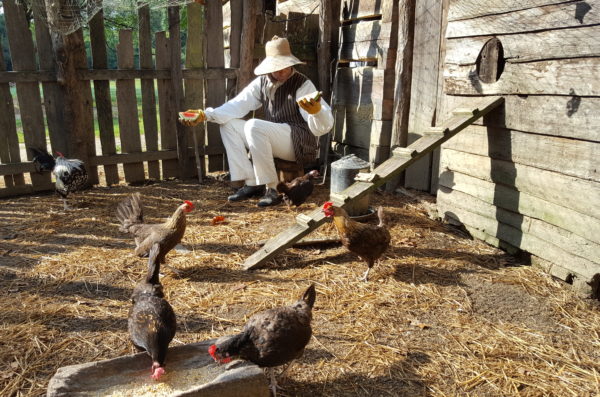
After Brandon opens a small doorway in the wall, the chickens emerge, strutting down a wooden plank into the enclosed yard. These chickens are roamers most of the time, allowed to range freely around the farm, nibbling on insects and trying to elude any overly-friendly guests.
He has them eating out of his hand. Literally. How could this not be a great part of the day?
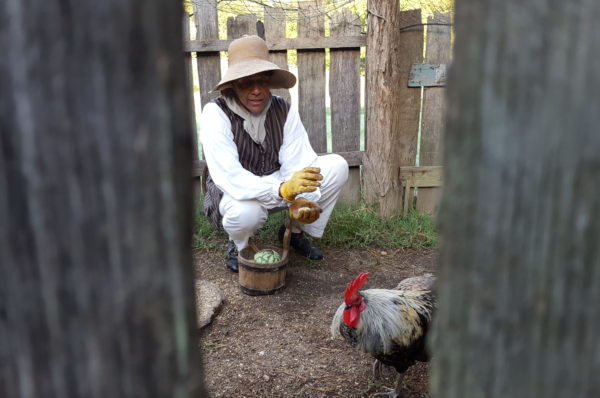
After a few minutes, it’s time to go see his favorite: Mandingo, a Silver Dorking rooster who rules the roost of Standard English Game hens in the coop adjacent to the slave house. “Their whole world is that little space,” says Brandon, “so I bring them goodies.”
The goodies are typically leftovers. Today, it’s half a watermelon, which he holds patiently while they come up and take their pecks. He also checks for eggs. Today the brood has produced four, which Brandon delivers to Nicole in the kitchen.
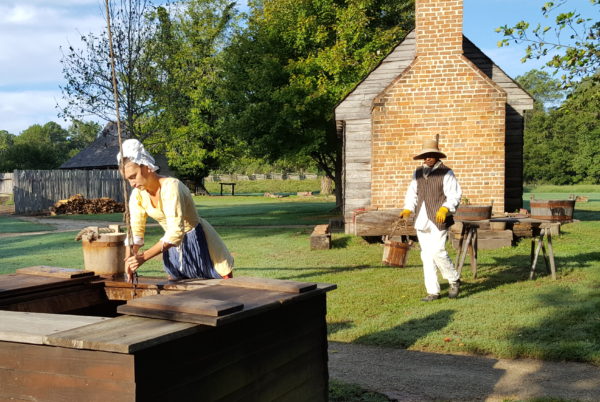
Then it’s on to other chores, like helping to draw water from the well and bringing a fresh supply of firewood to the kitchen, or harvesting some okra from the garden. Simple but necessary tasks.
Less simple, and more potentially backbreaking, is the field work, and here’s where Brandon really earned his keep this summer, putting in hundreds of hours on the crops of oats, corn, and the linchpin of 18th-century Virginia’s economy, tobacco.
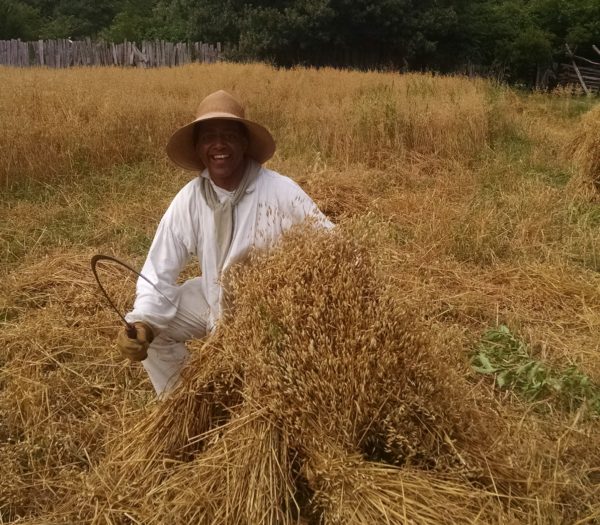
On his very first day back in June, Brandon was put to work worming the 208 tobacco plants on about one-eighth of an acre. Some of the pests this year were improbably large. “His enthusiasm for hard work is extraordinary,” says his mentor in historic farming, the indefatigable Ed Schultz.
For Brandon, it was a sobering hands-on experience that drove home the kind of labor wrung from Virginia’s enslaved. Many of us have read accounts of the tobacco economy: acres and yields, up and down years, quantities of hogsheads, profits and losses.
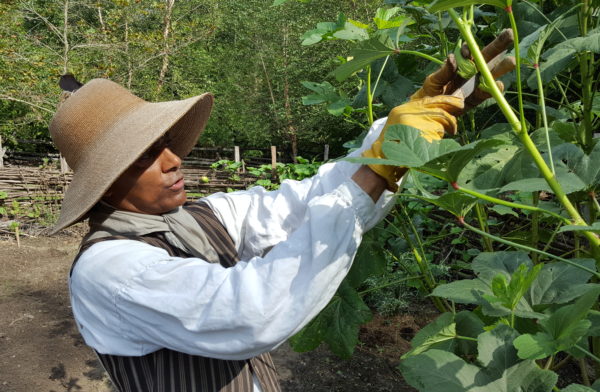
Becoming a field laborer for even a short time cast it in a new light. Sharper, more focused. “We’re out there for six hours,” says Brandon. “We have lunch. There’s shade and rest. We talk to people.” Enslaved Virginians worked as long as the sun lasted.
He says that whenever the heat seemed particularly brutal, or the labor tedious, someone would call out “forty-two hundred!” That’s how many tobacco plants Landon Carter suggested could be planted in one acre to maximize output. It’s a reminder that the 208 plants they tend really are nothing in comparison, and perhaps complaints are misplaced. Whatever else, it strikes me as a tremendous show of respect for the workers who built the tobacco empire.
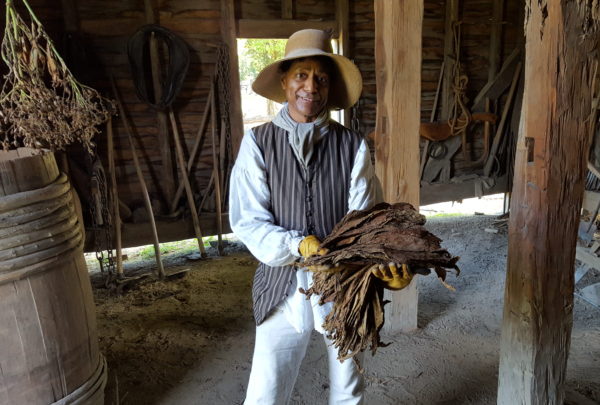
Standing in the tobacco barn, Brandon points out the tobacco that is hanging to cure. It takes four to six weeks, and he talks about how to identify the perfect cinnamon or chestnut brown color that signals it’s ready to be packed. One of the giant hogshead barrels that was used to ship tobacco stands nearby, and I ask Brandon whether he sees the crop differently.
“Before, I would say ‘cash crop,’” he says. “Now, when I see this tobacco, I think of the innocent blood spilled. It’s a crop of tears, of separation, of whipping, of greed. And a crop of hypocrisy. Patrick Henry said, ‘Give me liberty or give me death,’ but he owned dozens of men, women, and children.”
He imagines an enslaved woman, a new mom, who would have to return to the field soon after giving birth. Maybe she sets her baby down at the end of the tobacco row and working her way to the baby. She wants to comfort that child, but she can’t. There are mosquitoes, gnats, spiders, ants…
“As a historical interpreter I want to honor those who didn’t have a voice,” says Brandon. “I want to feed our guests with historical truth, and with heart and integrity. If something’s not right, you discard it.”
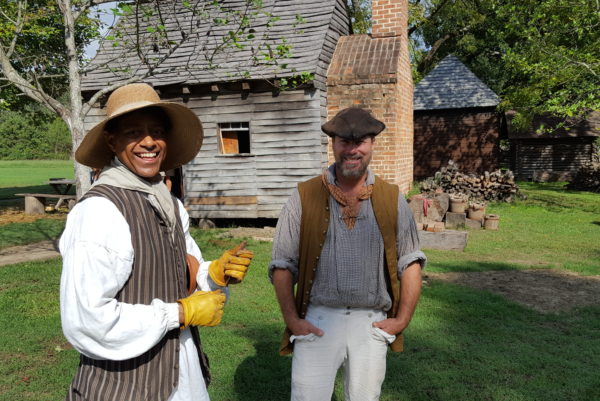
The facts matter. He usually gets one day a week to do historical research. He has a topic—maybe it’s shingles, maybe chickens—and heads over to Rockefeller Library to dig up as much information as he can consume. Ed says he’s one of the most committed interns he’s ever seen. “The way he threw himself into it, and wants to know everything—I’ve never seen anything like it.”
Brandon returns all the compliments. Calling the many colleagues who have shared their expertise over the past few months “blessings,” he lists them all by name. I tell him I can’t possibly write all the names down—there are too many, and I’m worried about missing someone. But on he goes, enumerating all the small kindnesses, inspiration, and knowledge he has been the recipient of.
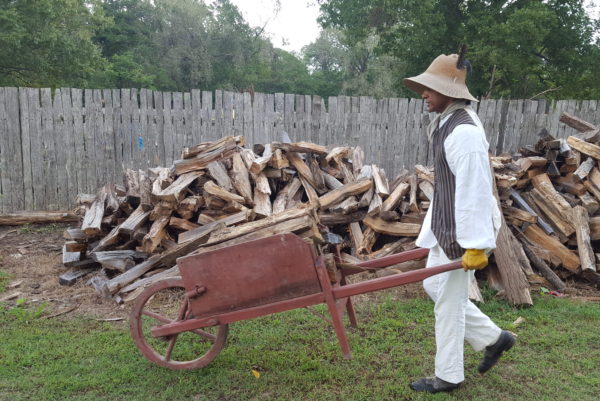
“I haven’t had a bad day here,” he says.
His biggest lesson, in the fields or in the stacks? “I don’t use the word ‘finish’ anymore. There’s too much to do, too much to learn.”
Next month, Brandon will return to his position as an Orientation Interpreter, assisting guests at site entrances. Feel free to ask him about farming.
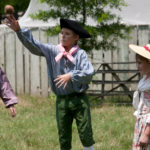
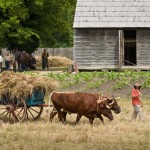
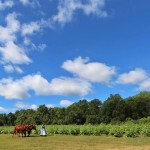
With Great Hopes being shut down now, what will happen to all the livestock? Relocation? Will anyone be keeping the fields or crops up, or will that be phased out as well? What a shame to loose this wonderful site.
Wanda,
Most of the livestock are already located elsewhere. I haven’t heard specific plans yet for the chickens, for example, but rest assured they’ll have a fine new home. We’re still figuring out many of the details, so stay tuned for more details.
This is such an incredible program! I have always wondered if the interpreters do living history or reenacting during their time at CW. Thank you for sharing the everyday pieces of their lives on this fantastic blog!!
Another wonderful blog, Bill. Every time I read one it makes me want to come back and visit CW again.
Great blog. Wonderful for Brandon to have this opportunity. I cannot image having to have a baby and having to put the baby down at the end of a row and having to go to work immediately afterwords with the gnats and other insects.
Brandon is one of the most enjoyable people to be around I’ve ever met and his enthusiasm for his job is unsurpassed. Thanks Bill for focusing today’s blog on an outstanding gentleman…and a good friend.
It’s my understanding that nicotine can be transmitted through the hands. Do the fieldworkers wear gloves?
Not usually, I’m told, but their exposure is pretty limited.
Hi, Helene! This is something I discuss often when I’m interpreting at the farm. We don’t handle nearly as much tobacco as someone who could get nicotine poisoning, thankfully. We do have gloves that we’ll wear (I usually wear them when working with the hoe since I’m prone to bloody blisters), so it is an option if we want!
What a fantastic program! Working as a craft interpreter in the 80’s we did some work learning to cut the wheat behind the mill, and rye at Carters Grove. Those were some of my favorite days. The fields were so tiny but it surely helped me understand the feel of the hard labor that life in the 18th century required. Awesome post!